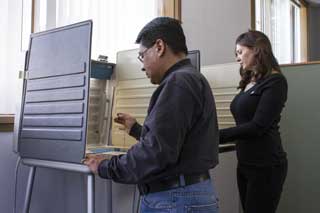The Word from Lansing: Elections—And Your Vote—Matter

Posted June 22, 2018
Two important dates are quickly approaching this summer. Monday, July 9 is the last day individuals can register to vote prior to the Michigan Primary Election, which will be taking place on Tuesday, August 7. Why are these dates significant? Because voting matters.
Elections have the potential to transform the institutions and issues people care about, including the economic opportunity in their community, the availability of affordable housing, the safety of the roads and bridges on which they travel, or the way human dignity is upheld. For better or for worse, communities feel the impact of the decisions made by their elected officials, and having an opportunity to voice concerns and hold officials accountable is paramount in the American political system.
Through elections, voters weigh in on the direction of their local community, state, and federal government. In this upcoming election, individuals can consider what Michigan’s main priorities should be going forward. Voters can consider how they would like limited resources allocated and which candidates would best support those goals. And they can consider how the State can preserve the very qualities and places that make Michigan special, for generations to come. Michigan’s elected officials are best able to serve when they hear from the wide range of those they represent: residents from all backgrounds, races, income levels, and ages.
The Catholic Church teaches that all people should play a role in public life, in the best way they can. Each “should be concerned to create and support institutions that improve the conditions of human life,” which includes government institutions, and voting can be one way to do that (Catechism of the Catholic Church, 1926). Pope Francis, too, reminded Catholics during a 2017 trip that it is important to be one who engages in political life and the building up of society, not just who watches “from the balcony” or criticizes others for their work while sitting idly by (Cesena, 10/1/17).
The August Primary Election provides the first step in selecting the candidates who will challenge each other in the November General Election. In some instances, the winner of particular primaries, depending on the office and district, could very well be the person who automatically wins in November. For this reason, primary elections are critically important and not to be overlooked. Likewise, the November 6 General Election will provide the opportunity to vote on critical statewide ballot proposals and an array of political offices. Voters will be electing the next governor, attorney general, secretary of state, one of Michigan’s United States Senate seats, members of the U.S. House of Representatives, members of the Michigan Senate and Michigan House of Representatives, and Michigan judges from the district, circuit, appellate, and Supreme Court levels. It is intended that MCC will provide, through its FOCUS publication, information about any statewide ballot proposals and how the proposal relates to Catholic social teaching. In addition, information will be offered on issues of concern to the Church. This information is for people of faith to contemplate as they develop their conscience and determine how to cast their vote.
Looking at the upcoming ballot, 2018 is a significant year. Take some time now to get registered and educated on the issues and candidates on the ballot. One great resource is the Michigan Voter Information Center, where voters can ask:
- Am I registered to vote? (If not, get registered by July 9).
- Where is MY polling place?
- What candidates and issues are on MY local ballot?
It is true that sometimes, the process can seem overwhelming. However, as the effects of elections are visible all over local communities, voting in August (and November) is a crucial action. Take the time to “descend from the balcony,” as Pope Francis would say, and work towards building a better society. It’s worth the effort.
